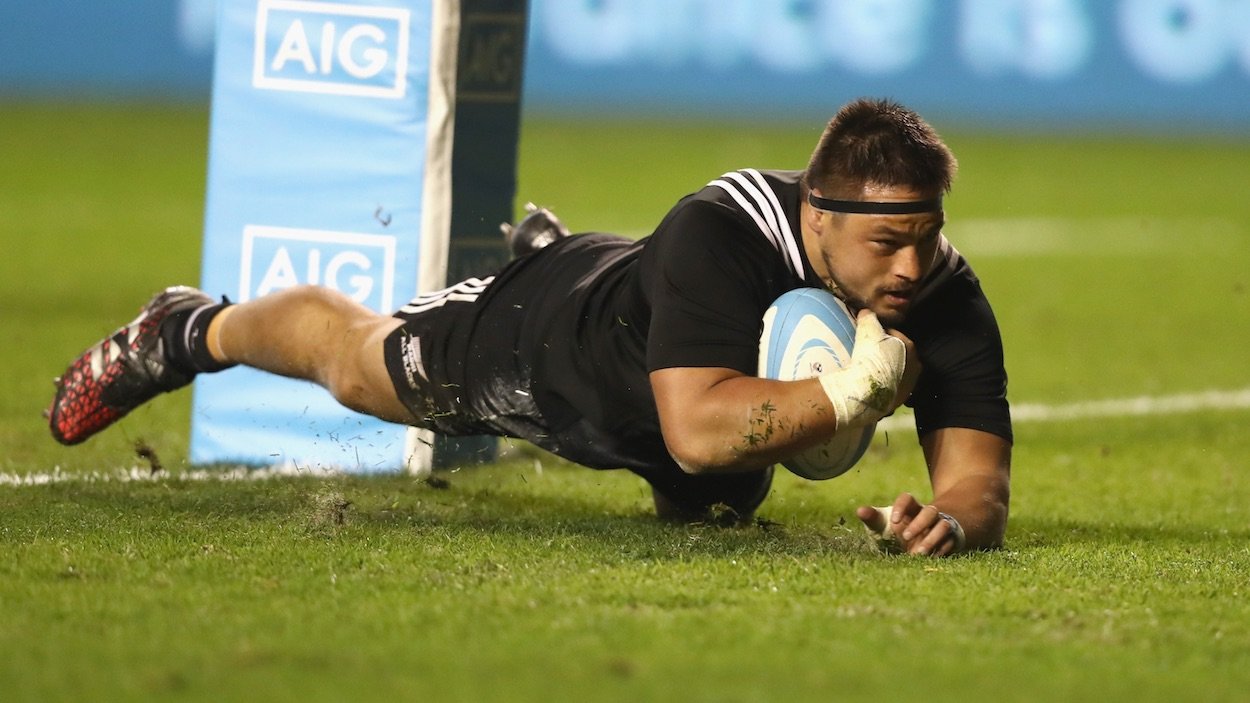A Wristband Too Far: Why Did Kane Hames' Standing Rock Stance Fall Foul Of His Rugby Bosses?

Jamie Wall reads between the lines of NZ Rugby’s recent wristband sanctions.
Normal transmission resumed over the weekend as the All Blacks trampled Italy 68-10 in Rome.
After their shock loss to Ireland in Chicago they were back to being the same old relentless All Blacks, but there was something a little different about the famous black jersey. Sewn on one of the arms was a poppy, to mark Remembrance Day. It’s not the first time the All Blacks have attached the poppy to their jerseys for a November test match in conjunction with the Returned Services Association to commemorate the 13 All Blacks who fell in World War I.
A week earlier, Maori All Blacks prop Kane Hames made a small addition to his match day attire as well, by writing on his wrist band. Usually a space reserved for tributes to mum, dad or Jesus, Hames used the match against the US Eagles to show his support for the Native American protest against the Dakota access pipeline at Standing Rock. If he hadn’t scored a try late in the game, no one might have even noticed.
Hames’ show of solidarity with the UN-backed movement caught headlines. Team management were quizzed on the subject and came back with a disappointing show of disapproval, coach Colin Cooper saying that “he’s playing for this team and we are part of New Zealand Rugby and Maori culture, that’s our drive and that’s what we will all be standing for”.
Hames was showing support for another indigenous culture, fighting to protect their land rights – something not too dissimilar to what Maori have faced over the last 170 or so years since the Treaty of Waitangi was signed. In fact, Hames’ Standing Rock stance came 135 years to the day of one of the most infamous Maori land confiscations in New Zealand history.
Spot the double standard?
Before and after the All Blacks trampling of Italy, viewers were subjected to a collection of soundbites from the players about how much the poppy on their jerseys meant to them. Which was fine, even if they did seem mawkishly scripted.
[rugbypass-ad-banner id=”1475535264″]
So is the message that symbolism and nods to causes are all good with the New Zealand Rugby powers-that-be, as long as they fit the narrative they want? It has a slightly unnerving parallel to the history the government seems to want us to remember. World War I: good, brave, heroic. Land Wars and broken treaty promises: the less said, the better.
And New Zealand Rugby certainly are good at saying nothing when they don’t want to, this year especially.
NZ Rugby enjoys a cosy relationship with the current government. The last World Cup squad was announced at Parliament. Prime Minister John Key has long been a regular in the changing rooms after games, and was in direct contact with senior All Blacks during New Zealand’s recent flag referendum. Israel Dagg once got himself in trouble with the Electoral Commission (but not NZ Rugby) for tweeting his support for Key in the last election.
The Maori All Blacks went on to lose their next match against Munster over the weekend, a match preceded by a widely praised and uniquely Maori tribute to the late Anthony Foley. Given the furore over Hames’ actions the week before, it seems like there’s a definite line that NZR are comfortable with when it comes to native culture expressing itself in representative teams.
Which, in itself, is a sad representation of a larger part of New Zealand than the country likes to admit.










































































